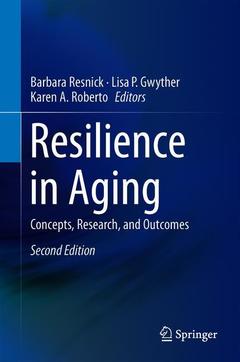Resilience in Aging (2nd Ed., 2nd ed. 2018) Concepts, Research, and Outcomes
Coordonnateurs : Resnick Barbara, Gwyther Lisa P., Roberto Karen A.

This updated and expanded second edition of Resilience in Aging offers a comprehensive description of the current state of knowledge with regard to resilience from physiological (including genetic), psychological (including cognitive and creative), cultural, and economic perspectives. In addition, the book considers the impact of resilience on many critical aspects of life for older adults including policy issues, economic, cognitive and physiological challenges, spirituality, chronic illness, and motivation. The only book devoted solely to the importance and development of resilience in quality of life among older adults, Resilience in Aging, 2nd Edition continues to offer evidence-based theory, clinical guidelines, and new and updated case examples and real-world interventions so professional readers can make the best use of this powerful tool. The critical insights in this volume are concluded with a discussion of future directions on optimizing resilience and the importance of a lifespan approach to the critical component of aging.
The book?s coverage extends across disciplines and domains, including:
- Resilience and personality disorders in older age.
- Cultural and ethnic perspectives on enhancing resilience in aging
- Sustained by the sacred: religious and spiritual factors for resilience in adulthood and aging.
- Building resilience in persons with early-stage dementia and their care partners.
- Interdisciplinary geriatric mental health resilience interventions.
- Developing resilience in the aged and dementia care workforce.
- Using technology to enhance resilience among older adults.
This wide-ranging and updated lifespan approach gives Resilience in Aging, 2nd Edition particular relevance to the gamut of practitioners in gerontologyand geriatrics, including health psychologists, neuropsychologists, clinical psychologists, psychiatrists, social workers, geriatricians, family physicians, nurses, occupational and physical therapists, among others.
Barbara Resnick, PhD, CRNP, FAAN, FAANP, is a professor in the Department of Organizational Systems and Adult Health at the University of Maryland School of Nursing. She holds the Sonya Ziporkin Gershowitz Chair in Gerontology at the School of Nursing, and she maintains a clinical/faculty position with clinical work at Roland Park Place, a Lifecare community. Her research focuses on optimizing function and physical activity, motivation, resilience and adherence to healthy behaviors. She has published over 250 articles in nursing and/or medical journals, numerous chapters in nursing and medical textbooks related to care of the older adult, and a book on restorative care nursing.
Lisa P. Gwyther, MSW, LCSW, is a clinical social worker, an associate professor in the Duke Department of Psychiatry and Behavioral Sciences and a Senior Fellow of the Duke Center for Aging. She is the founder and immediate past director of the Duke (Alzheimer’s) Family Support Program, a NC state-level first-responder for families and professionals with questions about dementia and family care. She is author of over 150 journal articles, book chapters and books on interventions to support individuals and families through progressive dementias, including the 2011 e-book, Living Well after a Diagnosis of Alzheimer's. Karen A. Roberto is a university distinguished professor, director of the Institute for Society, Culture and Environment, and senior fellow at the Center for Gerontology at Virginia Tech. She also holds secondary appointments in the departments of internal medicine and psychiatry and behavioral medicine at the Virginia Tech Carilion School of Medicine. Her research agenda focuses on health and social support in late life and includes multiple studies of the daily lives of older women with chronic health conditions, family relationships and caregiving, and elder abuse. She has published over 200 scholarly articles and book chapters, iseDate de parution : 01-2019
Ouvrage de 420 p.
15.5x23.5 cm
Thèmes de Resilience in Aging :
Mots-clés :
successful aging; psychological resilience; economical resilience; physiological resilience; interventions for resilience; motivating to increase reslience; arts and resilience in elderly; resilience in aging; worker resilience over the lifespan; civic engagement and elder resilience; religion; spirituality; and resilience; resilience in chronic illness; fostering resilience through narratives; geriatric mobile crisis response; optimizing reslience in older people; resilience and personality disorders in older age; creative resilience; resilience from a cultural perspective; resilience and stress in older age; resilience and aging friendly communiities



